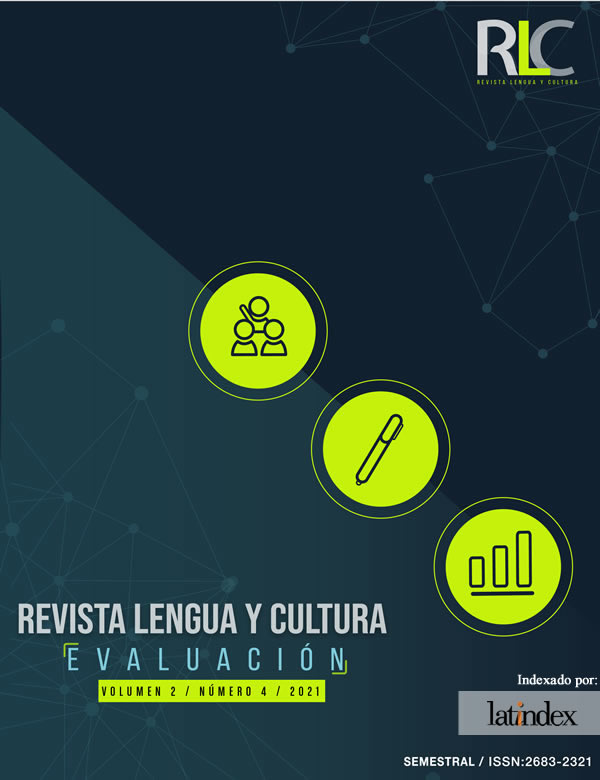The adjective in error analysis based on self-regulatory practices as error treatment.
Abstract
Within language learning contexts, error analysis represents a tool that enables teachers to identify causes in target language performance. By means of a corpus built from authentic written texts produced by students of French as a Foreign Language, this contribution analyses errors using the etiological criteria. This study, which has a mixed-methods research design and a descriptive scope, aims to identify errors in the use of adjectives and their gender and number agreement in French. The corpus is made of 188 written productions in French level A1, as well as 171 written productions in level A2. The texts were produced by students pursuing a degree in foreing language teaching. The foregoing is considered a variable within this study that collects both quantitative and qualitative data as it observes recurrences of the error while making an in-depth analysis to try to determine the causes behind it. The results show the importance of error identification in language teaching and how it can be addressed through self-regulatory practices.
Downloads
References
Alba Quiñones, V. de (2009). El análisis de errores en el campo del español como lengua extranjera: algunas cuestiones metodológicas. Revista Nebrija de Lingüística Aplicada, 5 (3), 1-16
Alexopoulou, A. (2006). Los criterios descriptivo y etiológico en la clasificación de los errores del hablante no nativo: una nueva perspectiva. Porta Linguarum: revista internacional de didáctica de las lenguas extranjeras, (5), 17-36.
Aregu, B. B. (2013). Enhancing Self-Regulated Learning in Teaching Spoken Communication: Does It Affect Speaking Efficacy and Performance? Electronic Journal of Foreign Language Teaching, 10(1).
Baralo, M. (1999). La adquisición del español como lengua extranjera. Arco/Libros.
Bégin, C. (2008). Les stratégies d’apprentissage: un cadre de référence simplifié. Revue des sciences de l'éducation, 34 (1), 47–67. https://doi.org/10.7202/018989ar
Besse, H., y Porquier, R. (1984). Grammaires et didactique des langues (Vol. 9). Hatier.
Brown, H. (2006). Principles of Language Learning and Teaching.
Cenoz, J. (2001). The effect of linguistic distance, L2 status and age on cross-linguistic influence in third language acquisition. Cross-linguistic influence in third language acquisition: Psycholinguistic perspectives, 111(45), 8-20.
Cosnefroy, L. (2011). L’apprentissage autorégulé: entre cognition et motivation. Presses universitaires de Grenoble
Corder, S. P. (1983). A role for the mother tongue. Language transfer in language learning, 1, 85-97.
De Angelis, G., y Selinker, L. (2001). Interlanguage transfer and competing linguistic systems in the multilingual mind. Bilingual Education and Bilingualism, 42-58.
Dewaele, J. M. (1998). Lexical inventions: French interlanguage as L2 versus L3. Applied linguistics, 19(4), 471-490.
Duncan, T. y McKeachie, W. (2005) The Making of the Motivated Strategies for Learning Questionnaire. Educational Psychologist, 40(2), 117-128. doi: 10.1207/s15326985ep4002_6
Ellis, R. (1985). Understanding second language acquisition (Vol. 47, p.73). Oxford: Oxford university press.
Fernández, S. (1997). Interlengua y análisis de errores: en el aprendizaje del español como lengua extranjera. Edelsa Grupo Didascalia.
Gómez, J. y Ferreira, A. (2017). Análisis de errores recurrentes en el Corpus de Aprendices de Español como Lengua Extranjera, CAELE. Revista Brasileira de Linguística Aplicada, 17(3), 509-538. Epub July 27, 2017.https://doi.org/10.1590/1984-6398201710927
Granger, S. (2009). The contribution of learner corpora to second language acquisition and foreign language teaching. Corpora and language teaching, 33(13).
Griffin, K. (2005). Lingüística aplicada a la enseñanza del español como 2/L. Madrid: Arco/Libros.
Hammarberg, B. (2001). Roles of Ll and L2 in L3 production and acquisition. Cross-linguistic influence in third language acquisition: Psycholinguistic perspectives, 31, 21.
Han, Z., y Odlin, T. (Eds.). (2006). Studies of fossilization in second language acquisition (Vol. 14). Multilingual Matters.
Lantolf, J. P. (2006). Language emergence: Implications for applied linguistic. A sociocultural perspective. Applied linguistics, 27(4), 717-728.
Nemser, W. (1971). Approximative systems of foreign language learners. IRAL-International Review of Applied Linguistics in Language Teaching, 9(2), 115-124.
Pendar, N., y Chapelle, C. A. (2008). Investigating the promise of learner corpora: Methodological issues. CALICO journal, 25(2), 189.
Pintrich, P.R. (2000). The Role of Goal Orientation in Self-Regulated Learning. In M. Boekaerts, P. R. Pintrich, & M. Zeidner (eds.), Handbook of Self-Regulation (pp. 451-502). Academic Press. doi:https://doi.org/10.1016/B978-012109890-2/50043-3
Porquier, R. (1977). L'analyse des erreurs. Problèmes et perspectives. Études de linguistique appliquée, 25, 23.
Selinker, L. (1972). Interlanguage. Error analysis. Perspectives on Second Language Acquisition. London: Longman.
Touchie, H. Y. (1986). Second language learning errors: Their types, causes, and treatment. JALT journal, 8(1), 75-80.
Usher, E. L., y Schunk, D. H. (2017). Handbook of Self-Regulation of Learning and Performance. DH Schunk & JA Greene, Social Cognitive Theoretical Perspective of Self-Regulation, 19-35.
Vázquez, G. E. (1999). ¿ Errores?¡ Sin falta!. Edelsa Grupo Didascalia.
Zimmerman, B. y Schunk, D. H. (2011). Handbook of self-regulation of learning and performance. Routledge.
Zimmerman, B. (2000). Attaining Self-Regulation: a social cognitive perspective. En M. Z. En M. Boekaerts, Handbook of self regulation (pp. 13-39). Academic Press. http://dx.doi.org/10.1016/B978-012109890-2/50031-7.
Copyright (c) 2021 Jesús Eduardo Fong Flores

This work is licensed under a Creative Commons Attribution-NonCommercial-NoDerivatives 4.0 International License.













